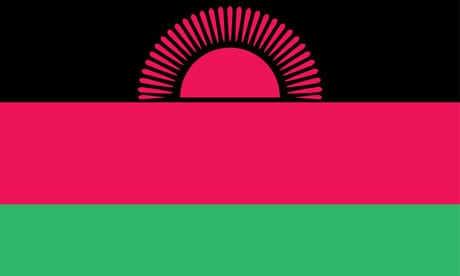Malawi is to revert to its old national flag, a move approved by a parliamentary bill and representing the second change over the emblem in the space of two years.
The country's independence-era flag, first hoisted in 1964, was altered in 2010 by the government under the former president Bingu wa Mutharika.
The flag's image of a red rising sun was replaced with a full white sun to signify Malawi fulfilling its promise on development.
Mutharika, who held power for eight years and died in April aged 78 from a heart attack, had claimed the country could not continue "to be at dawn in 2010 as we were in 1964 … we don't have to live permanently in the past".
During his presidency, he had been viewed as becoming increasingly autocratic and was criticised for allegedly having the new flags made of imported polyester from China, a country he courted assiduously.
The cost of the flag to taxpayers was 2.6bn kwacha (£6.5m), according to local press reports.
Mutharika's successor, Joyce Banda, has reversed many of his policies. "In the opinion of the cabinet, there was no compelling reason for changing the independence flag," the Nyasa Times quoted the president as saying.
In parliament, the leader of the house, Henry Phoya, argued that Mutharika had not conducted proper consultations before making the change and said that the national flag showing black, red and green stripes with a red rising sun was a "sacred symbol" of Malawi's nationhood.
"Changing it willy-nilly is an unfair attack on a country's sense of nationhood, an attack on a symbol which Malawians hold so dearly and passionately," Phoya said. "[The other] strange and rather meaningless flag reflected that the leadership was out of touch with the feelings of people it was governing."
John Tembo, leader of the opposition, the Malawi Congress party, endorsed the decision, describing the change as "stupid". He said: "No one can just wake up and change history. This is a day we were waiting for to change the flag."
But the former ruling Democratic Progressive party said spending money on changing the flag again should not be a priority while the economy was struggling.
One of the most notable flag changes in Africa happened in South Africa to mark the beginning, in 1994, of multiracial democracy.
